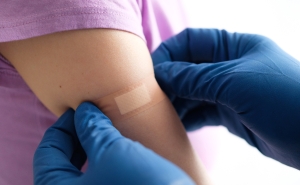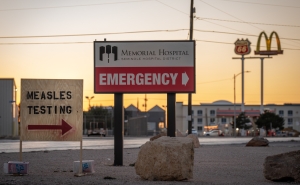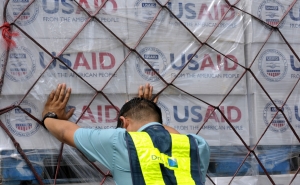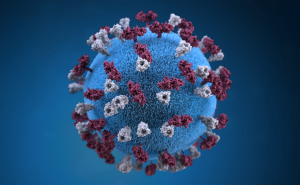Q&A: Why Can’t COVID-19 Be Eradicated and Other Lingering Questions
Crystal Watson answers more COVID-19 questions.

More than two years into the pandemic, people still have questions about COVID-19. Crystal Watson, DrPH, MPH, senior scholar at the Johns Hopkins Center for Health Security, recently returned to Public Health On Call to talk through some of the queries listeners have sent to publichealthquestion@jhu.edu.
Public Health On Call
This article was adapted from the July 1 episode of Public Health On Call Podcast.
Why could smallpox be eradicated, but not COVID-19?
There are a number of factors that made smallpox eradicable and that make SARS-CoV-2 impossible to eradicate.
First, smallpox only infected humans, whereas SARS-CoV-2 has many animal reservoirs. Even if we could stop transmission in humans, it could always spill over again.
Second, smallpox was straightforward to identify, but COVID is much harder. With smallpox, there is a characteristic rash. With COVID, you have flu-like symptoms which makes it hard to distinguish from other illnesses.
Third, smallpox was also primarily transmitted through respiratory droplets and close contact, making it less transmissible than SARS-CoV-2, which can spread through droplets and aerosols.
Lastly, herd immunity was much easier to reach with smallpox than COVID. Smallpox infection or vaccination provide long-lasting immunity and protection against the virus—lifelong in some cases. Right now, COVID is ubiquitous throughout the world. The virus is changing quickly and causing reinfections. Even if you’ve had it once, you can get it again.
Is it true that long COVID may be less likely with omicron?
We’re still getting data on this. One study published in the Lancet showed somewhat lower odds of developing long COVID with omicron vs. delta.
We need to keep in mind that this may change with new subvariants. It still means long COVID in a lot of people, because omicron is infecting many more people than delta did. Even though the odds may be slightly lower, this is still a big issue.
What is the actual risk of long COVID?
We probably underestimate what long COVID might do to our lives. It’s still important to prevent infection for myself and my family, because we don’t want long COVID syndromes that could impact us for the rest of our lives in some cases. That influences me to take more precautions, like wearing a mask and testing before I travel.
Is it okay to use expired COVID tests?
Tests do expire and, when they do, they’re less likely to give you an accurate result.
Check with the test manufacturer or the FDA’s website [because] a lot of these tests have expiration dates that have been extended. The [FDA] has looked at the tests and found they work longer than initially thought. (Learn more about expired tests from the COVID-19 Testing Toolkit.)
Am I more likely to get severe COVID from someone who has never been vaccinated, or someone who is vaccinated and boosted?
Severity of COVID is probably related to a number of different things, [such as] a person’s susceptibility to severe disease, given underlying conditions and factors like their immune system response.
In some cases, the amount of virus they are exposed to can influence how sick a person gets. For instance, people who are not vaccinated can have a higher viral load and potentially pass on more virus to other people. People who are unvaccinated also shed the virus for a longer period of time.
Generally, people aren’t at much higher risk of severe infection from an un- or undervaccinated person because the main factor is susceptibility.
Do you think the guidelines* around testing will change, now that reinfection can occur within weeks of recovery?
*Current CDC guidelines state: Most people with a history of test-confirmed COVID-19 who remain symptom-free after recovery do not need to retest or quarantine if another exposure occurs within 90 days after their initial infection.
In some ways, this has changed already—we have much greater availability of at-home antigen tests. People are using these tests to rule out COVID in many different situations. The CDC recommends using tests if you have COVID-like symptoms, if you’ve had a known exposure, as screening for schools or work or large gatherings, and in some cases, before and after travel.
PCR tests can be much more sensitive and pick up the virus for some time after a person is no longer infectious. That recommendation probably won’t change.
Should people who still test positive after taking Paxlovid be treated again?
Right now, there’s not much evidence to support a longer or new treatment course if someone is continuing to test positive after taking Paxlovid. We know from clinical trials that some people have persistent positive tests after they receive treatment. Most people in trials didn’t have symptoms if they were still positive and there was not a high likelihood of those people being hospitalized or becoming severely ill.
There were many challenges in responding to SARS-CoV-2. How is the world responding to the emergence of widespread monkeypox?
This is a very different scenario than we’ve seen with monkeypox in the past. We’re trying to ramp up our capacity for testing, surveillance, and messaging to make people who are vulnerable aware of the symptoms and the risks they face.
Although we have two vaccines stockpiled in the U.S. and elsewhere in the world that can be helpful against monkeypox, they are in limited supply. We’re racing to catch up on what to do if we need more vaccines.
We have work to do to build up our public health response capacity to new infectious diseases. Our global cooperation and coordination needs improvement, even after COVID. Monkeypox has existed for some time—it’s endemic in some countries in Africa. Now that we have global cases, we need to make sure that people in Africa also have access to the treatments and vaccines that we’re working on in the U.S. and elsewhere.
Joshua Sharfstein, MD, is the vice dean for Public Health Practice and Community Engagement and a professor in Health Policy and Management at the Johns Hopkins Bloomberg School of Public Health. He is also the director of the Bloomberg American Health Initiative and a host of the Public Health On Call podcast.
Crystal Watson, DrPH, MPH, is a senior scholar at the Johns Hopkins Center for Health Security and an assistant professor in Environmental Health and Engineering at the Johns Hopkins Bloomberg School of Public Health.





